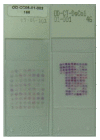Survey of molecular profiling during human colon cancer development and progression by immunohistochemical staining on tissue microarray
- PMID: 17278192
- PMCID: PMC4066002
- DOI: 10.3748/wjg.v13.i5.699
Survey of molecular profiling during human colon cancer development and progression by immunohistochemical staining on tissue microarray
Abstract
Aim: To explore the molecular events taking place during human colon cancer development and progression through high-throughput tissue microarray analysis.
Methods: We constructed two separate tissue microarrays containing 1.0 mm or 1.5 mm cylindrical samples acquired from 112 formalin-fixed and paraffin-embedded blocks, including carcinomas (n = 85), adenomatous polyps (n = 18), as well as normal para-cancerous colon tissues (n = 9). Immunohistochemical staining was applied to the analysis of the consecutive tissue microarray sections with antibodies for 11 different proteins, including p53, p21, bcl-2, bax, cyclin D1, PTEN, p-Akt1, beta-catenin, c-myc, nm23-h1 and Cox-2.
Results: The protein expressions of p53, bcl-2, bax, cyclin D1, beta-catenin, c-myc, Cox-2 and nm23-h1 varied significantly among tissues from cancer, adenomatous polyps and normal colon mucosa (P = 0.003, P = 0.001, P = 0.000, P = 0.000, P = 0.034, P = 0.003, P = 0.002, and P = 0.007, respectively). Chi-square analysis showed that the statistically significant variables were p53, p21, bax, beta-catenin, c-myc, PTEN, p-Akt1, Cox-2 and nm23-h1 for histological grade (P = 0.005, P = 0.013, P = 0.044, P = 0.000, P = 0.000, P = 0.029, P = 0.000, P = 0.008, and P = 0.000, respectively), beta-catenin, c-myc and p-Akt1 for lymph node metastasis (P = 0.011, P = 0.005, and P = 0.032, respectively), beta-catenin, c-myc, Cox-2 and nm23-h1 for distance metastasis (P = 0.020, P = 0.000, P = 0.026, and P = 0.008, respectively), and cyclin D1, beta-catenin, c-myc, Cox-2 and nm23-h1 for clinical stages (P = 0.038, P = 0.008, P = 0.000, P = 0.016, and P = 0.014, respectively).
Conclusion: Tissue microarray immunohistochemical staining enables high-throughput analysis of genetic alterations contributing to human colon cancer development and progression. Our results implicate the potential roles of p53, cyclin D1, bcl-2, bax, Cox-2, beta-catenin and c-myc in development of human colon cancer and that of bcl-2, nm23-h1, PTEN and p-Akt1 in progression of human colon cancer.
Figures




References
-
- Pohl C, Hombach A, Kruis W. Chronic inflammatory bowel disease and cancer. Hepatogastroenterology. 2000;47:57–70. - PubMed
-
- Fearon ER, Hamilton SR, Vogelstein B. Clonal analysis of human colorectal tumors. Science. 1987;238:193–197. - PubMed
-
- Kallioniemi OP, Wagner U, Kononen J, Sauter G. Tissue microarray technology for high-throughput molecular profiling of cancer. Hum Mol Genet. 2001;10:657–662. - PubMed
-
- Serrano R, Gómez M, Farre X, Méndez M, De La Haba J, Morales R, Sanchez L, Barneto I, Aranda E. Tissue microarrays (TMAS) in colorectal cancer: Study of clinical and molecular markers. ASCO Meeting Abstracts. 2004;22:9665.
-
- Chung DC. The genetic basis of colorectal cancer: insights into critical pathways of tumorigenesis. Gastroenterology. 2000;119:854–865. - PubMed
Publication types
MeSH terms
LinkOut - more resources
Full Text Sources
Other Literature Sources
Research Materials
Miscellaneous

